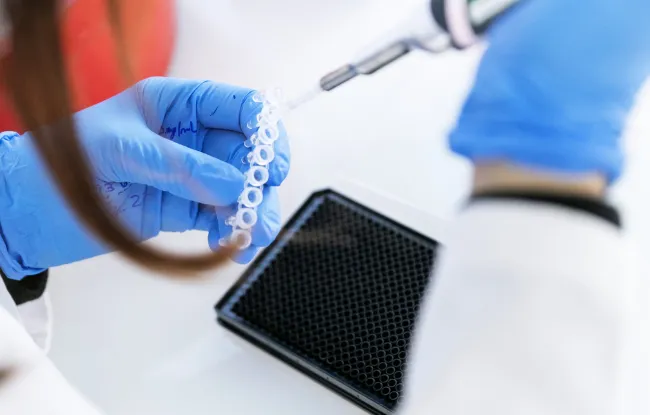- Home >
- Institut Curie News >
- Abivax’s molecule, developed at Institut Curie, achieves clinical success and secures historic fundraising
Abivax, a biopharmaceutical company specializing in chronic inflammatory diseases, has announced highly positive Phase 3 results for obefazimod, a molecule stemming from research conducted at Institut Curie. This success in treating ulcerative colitis enabled the company to raise $747.5 million in the United States in record time, a historic milestone for a French biotech. More importantly, this breakthrough opens up a new therapeutic pathway for millions of patients affected by this currently difficult-to-treat inflammatory bowel disease.
“It is a great source of pride to see a molecule designed and synthesized at Institut Curie successfully complete clinical trials,” said Dr. Cécile Campagne, Director of Institut Curie’s Technology Transfer Office and Deputy Director of Carnot Curie Cancer. “This success, which would not have been possible without the support of Truffle Capital and Sofinnova Partners, illustrates the strength of Institut Curie’s technology transfer strategy and reinforces the prominence of French research as a driver of innovation, to the benefit of patients.”
Founded in 2009, Abivax was born from a collaboration between the "Chemistry and Modeling for Cancer Biology" unit of Institut Curie (CNRS/Inserm/Université Paris-Saclay), led by Dr. Florence Mahuteau-Betzer, Research Director at CNRS, and the Institute of Molecular Genetics of Montpellier (IGMM). The company specializes in developing therapeutic products that harness the body’s natural regulatory mechanisms to stabilize immune responses in patients with chronic inflammatory diseases.
Its flagship product, obefazimod, was discovered following a screening of Institut Curie’s Chemical Library, also overseen by Dr. Florence Mahuteau-Betzer. This collection of over 10,000 molecules enables high-throughput screening of compounds to identify so-called "hit"1 molecules.
Abivax has just announced positive results from its Phase 3 ABTECT-1 and ABTECT-2 trials, two 8-week induction2 studies evaluating obefazimod in adult patients with moderately to severely active ulcerative colitis (UC). By modulating the expression of microRNA-124 (miR-124), a key regulator of inflammation, obefazimod achieved symptom remission in patients. This inflammatory bowel disease affects between 5 and 7 million people worldwide, often young adults, and nearly 1 in 1,000 people in France, according to the national health insurance (Assurance Maladie). Current treatments fail to adequately manage all cases, making this advancement particularly promising.
“Seeing this molecule offer a real treatment promise for millions of ulcerative colitis patients is profoundly gratifying. This success is the result of a long-standing collaboration between the teams of Institut Curie, the IGMM, and Abivax, who combined their expertise to design and synthesize obefazimod,” said Dr. Mahuteau-Betzer.
Following the publication of its positive Phase 3 results, Abivax raised $747.5 million (equivalent to €637.5 million) within a few hours, an exceptional performance for a French biotech company, propelling it among the global leaders in the sector. These funds are intended to accelerate the clinical development of obefazimod and to prepare the submission of a New Drug Application for the treatment of ulcerative colitis.
Marc de Garidel, CEO of Abivax, commented: “Today marks a significant milestone for Abivax, and more importantly, for the ulcerative colitis community. The strength of these results reinforces our belief in obefazimod, our first-in-class miR-124 enhancer, and its potential to become a transformative new treatment modality for patients with UC. Pending successful results from the 44-week maintenance trial, we are preparing to submit a New Drug Application to the FDA in the second half of 2026. We would like to thank the patients who participated in the trials as well as the investigators and staff at over 600 sites in 36 countries who contributed to the landmark trials.”
Since its inception, Abivax has been developing, under license from Institut Curie, CNRS, and the University of Montpellier, a portfolio of over 20 patents, several of which stem from co-developments with Institut Curie teams.
[1] Primary screening allows for the identification of molecules showing significant activity, referred to as "hits." These molecules are then retested in a secondary screening to confirm and further characterize their activities.
[2] An "induction trial" refers to the initial phase of a treatment aimed at rapidly inducing symptom improvement in patients.



